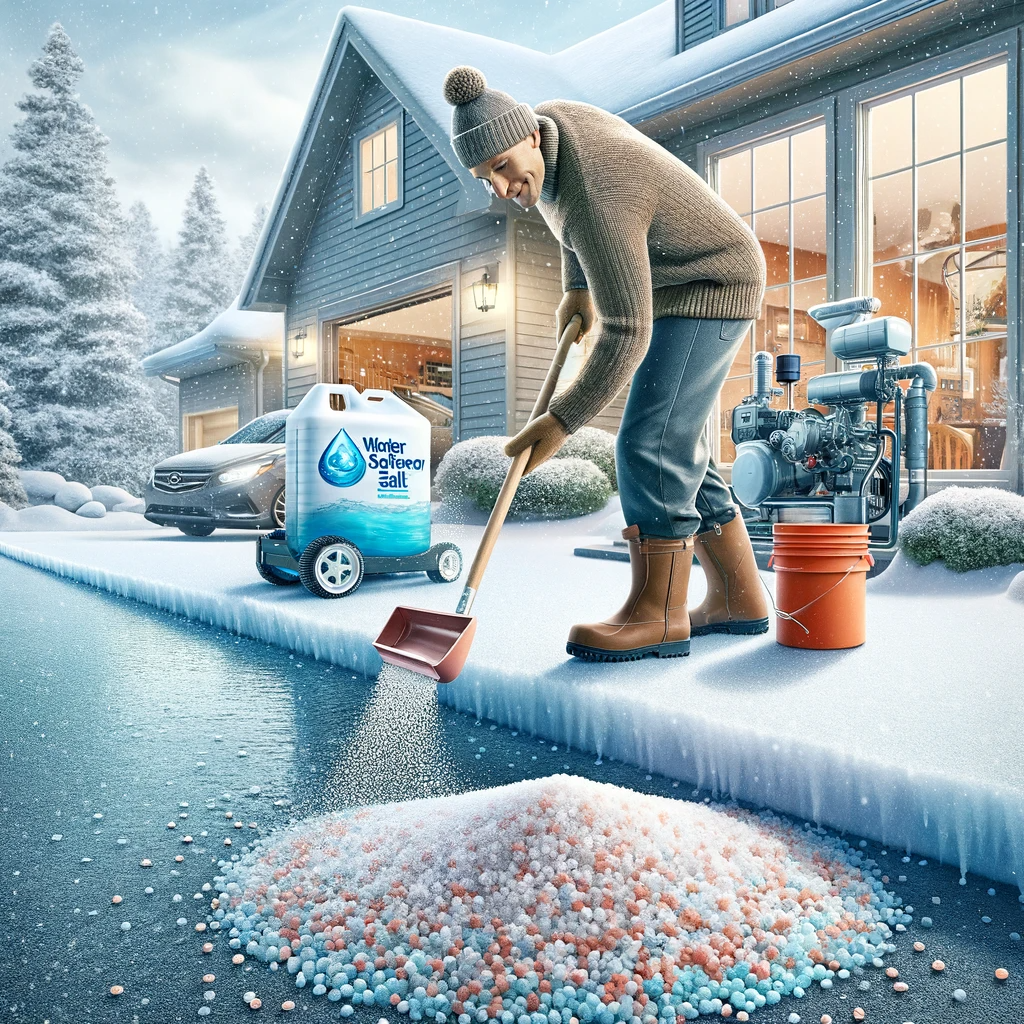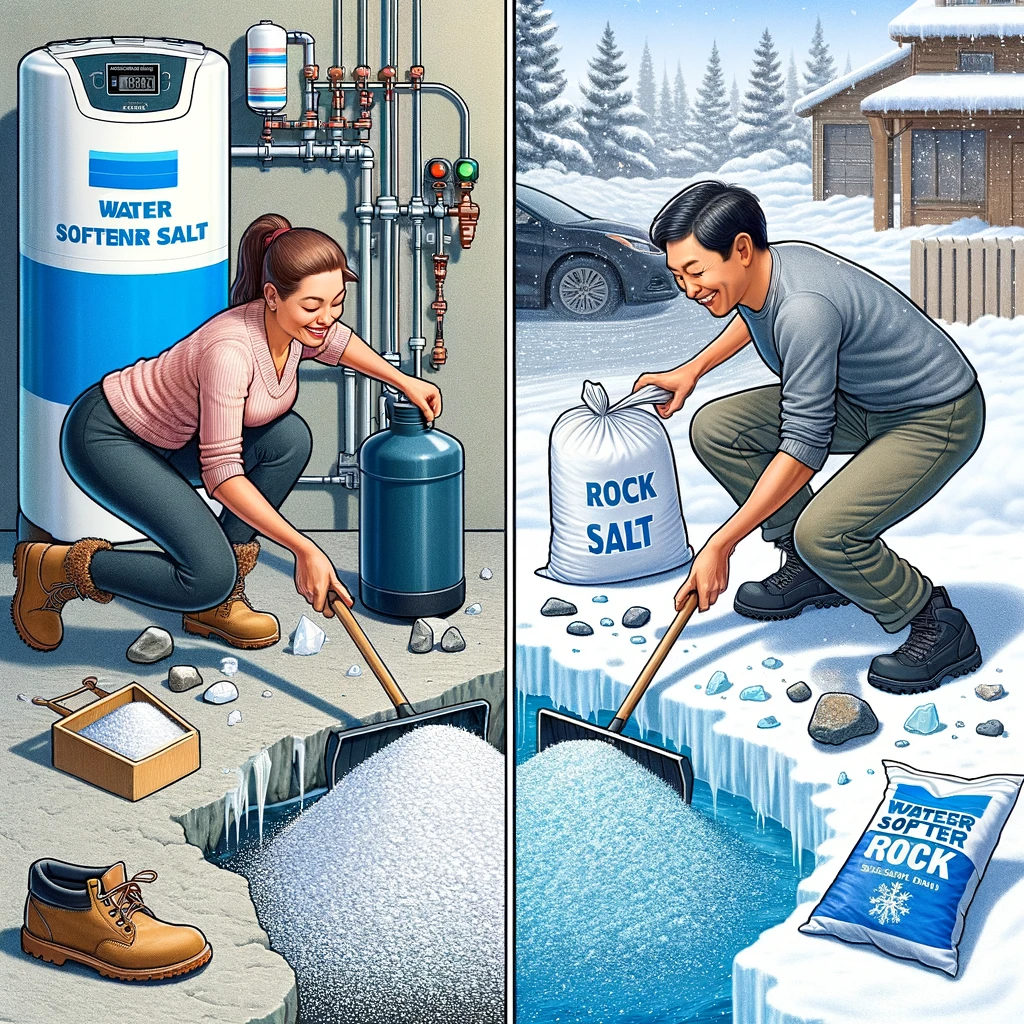Water softener salt can be used for ice melt, as it has the property of decreasing the melting point of water, causing the ice to melt quickly. However, it is important to note that some water softener salts can be coarse and may not dissolve as quickly as finer-grained materials typically used for melting ice.
Additionally, water softener salt is usually higher priced than road salt, so it may be more economical to use the finer-grained options for ice melt.
Using Water Softener Salt For Ice Melt
When it comes to battling icy conditions during the winter, most homeowners reach for rock salt or ice melt products. However, what if you find yourself without either of these options? Can you use water softener salt instead? Let’s explore the possibility of using water softener salt for ice melt, how it can be used on driveways and roofs, and the benefits it offers.
Using Water Softener Salt On Driveways
If you’re facing a slippery driveway that needs immediate attention, water softener salt can come to the rescue. The coarse texture of water softener salt helps create traction on the icy surface, making it safer to walk or drive on. Simply spread a generous amount of water softener salt evenly across your driveway, paying extra attention to the areas that are most prone to ice buildup.
Using Water Softener Salt On Roofs
Ice dams on roofs can cause significant damage if left untreated, as they can lead to leaks and structural issues. To prevent ice dams or remove existing ice buildup, water softener salt can be a viable solution. Sprinkling water softener salt on your roof can aid in melting the ice, allowing it to slide off the roof and reduce the risk of damage. However, it’s important to exercise caution when working on a roof to avoid accidents.

Using Water Softener Salt To Melt Ice
Water softener salt contains sodium chloride, which lowers the freezing point of water and accelerates the melting process. This makes it a suitable alternative for ice melt, especially when other options are unavailable. Whether you need to de-ice your walkway, patio, or stairs, water softener salt can effectively melt the ice, providing a safer environment for walking and preventing slips and falls.
In addition to its ice-melting properties, water softener salt can be used for other purposes as well. It can be used to clean metals, kill weeds, and even deter slugs in your vegetable garden. However, it’s worth noting that water softener salt should not be used for cooking or consumption.
So, if you find yourself in a situation where traditional ice melt products are not available, consider using water softener salt as a reliable alternative.
Safety Considerations
Using water softener salt for ice melt on your driveway may not be as effective as using finer-grained materials specifically designed for melting ice. Additionally, water softener salt can be irritating to the skin and paws of pets if they come into contact with it.
Potential Risks To Pets
Pets, such as dogs and cats, are curious creatures that often explore their surroundings, including outdoor areas. Therefore, it is crucial to consider their safety when it comes to using water softener salt for ice melt. Ice-melting chemicals often have rock salt (sodium chloride), calcium chloride, potassium chloride, magnesium chloride, and urea, also called carbonyl diamide. If you swallow these chemicals, they can be irritating and make your stomach hurt. Additionally, they can also cause skin and paw irritation and dryness when in direct contact. Therefore, it is important to take precautions to protect your furry friends from any potential harm.
Proper Handling And Storage Of Water Softener Salt
Proper handling and storage of water softener salt are essential to ensure safety and effectiveness when using it for ice melt. Here are a few guidelines to follow:
- Always wear gloves and goggles when handling water softener salt to protect your skin and eyes from potential irritation.
- Store water softener salt in a cool, dry place away from moisture and direct sunlight. This will prevent clumping and maintain its effectiveness.
- Avoid storing water softener salt near food or pet supplies to prevent any accidental ingestion by pets or humans.
- When applying water softener salt for ice melt, follow the manufacturer’s instructions carefully to ensure the right amount is used and spread evenly.
- After applying water softener salt, keep pets indoors or restrict their access to the treated area until the ice has melted and the area has been rinsed.
By following these safety guidelines, you can minimize any potential risks associated with using water softener salt for ice melt and create a safer environment for both your pets and yourself. Remember, their well-being should always be a top priority when considering ice melt options.
Alternative Uses For Water Softener Salt
Melting Ice And Snow
Salt crystals from water softener salt can be a great alternative to traditional rock salt for melting ice and snow. The salt crystals can lower the freezing point of water, thus speeding up the ice melting process. This makes them a convenient and effective solution for clearing driveways, pathways, and sidewalks during the winter months.
Cleaning Metals
In addition to melting ice and snow, water softener salt can also be used for cleaning metals. The abrasive nature of the salt crystals helps remove rust, tarnish, and other stubborn stains from various metal surfaces. Simply create a paste by mixing water softener salt with a small amount of water, apply it to the metal, and gently scrub with a soft cloth or brush. Rinse thoroughly afterward to reveal a shiny and polished finish.
Killing Weeds
Another useful application of water softener salt is in killing weeds. The salt dehydrates the weeds and disrupts their growth, making them wither and die. It can be particularly effective for controlling weeds in gardens, patios, and other outdoor areas. Sprinkle a generous amount of water softener salt around the base of the weeds and allow it to sit for a few days. Then, gently remove the remains of the weeds and dispose of them properly.

Using Water Softener Salt Vs Rock Salt
While melting ice on your driveway or walkway, you may wonder if you can use water softener salt instead of rock salt. In this article, we will compare the effectiveness, cost considerations, and chemical composition of these two options.
Comparing Effectiveness
Both water softener salt and rock salt are effective ice melt products. However, there are a few key differences to consider. Because it lowers the freezing point of water, water softener salt, also called sodium chloride, does its job. It can effectively melt ice, but it tends to work more slowly than rock salt. On the other hand, rock salt, which contains larger granules, can melt ice quickly and is particularly effective at preventing refreezing.
Cost Considerations
When it comes to cost, water softener salt is generally more affordable than rock salt. Water softener salt is widely available and often comes in large bags, making it a cost-effective option for melting ice. On the other hand, rock salt may be slightly more expensive, especially if you choose a brand that offers additional features such as added traction or reduced environmental impact. However, the extra cost may be worth it if you prioritize speed and effectiveness.
Chemical Composition
The chemical composition of water softener salt and rock salt differs slightly. Water softener salt is primarily composed of sodium chloride, which is safe to use around pets and plants. On the other hand, rock salt may contain other chemicals such as calcium chloride or magnesium chloride, which can be harmful if ingested by pets or come into contact with plants. If you have pets or a garden, using water softener salt may be a safer option.
In conclusion, both water softener salt and rock salt can be used effectively for ice melt. Water softener salt is more affordable and has a lower risk of harm to pets and plants. On the other hand, rock salt is faster-acting and may be more effective at preventing refreezing. Ultimately, the choice depends on your priorities and budget. Whichever option you choose, remember to follow the instructions carefully and apply the ice melt product according to the recommended dosage for best results.
Frequently Asked Questions On Can You Use Water Softener Salt For Ice Melt
Is Water Softener Salt Safe For Ice Melts For Pets?
Water softener salt is not safe for ice melts for pets. It can be irritating if swallowed and cause irritation and dryness on the skin or paws. It is best to use pet-friendly ice melt products to ensure the safety of your pets.
What Else Can Water Softener Salt Be Used For?
Water softener salt can be used to melt ice or snow, clean metals, kill weeds, and get rid of slugs in a vegetable garden. However, it cannot be used for cooking or consumption.
Can I Use Water Softener Salt Instead Of Rock Salt For Ice Cream?
No, water softener salt should not be used instead of rock salt for making ice cream. Rock salt, also known as ice-cream salt, is specifically designed for this purpose and is readily available at hardware stores. Using water softener salt or other alternatives may not yield the desired results and could potentially contain harmful chemicals.
Can You Use Water Softener Salt To Melt Ice On Roof?
Yes, you can use water softener salt to melt ice on the roof. Water softening salt lowers the melting point of water, making ice melt faster. It is an effective and affordable option for ice removal.
Can You Use Water Softener Salt For Ice Melt?
Using water softener salt for ice melt is not recommended. It can be irritating to pets and may contain harmful chemicals.
Conclusion
To conclude, while water softener salt can be used for ice melt, there are a few things to consider. It contains sodium chloride, which can be harmful if ingested by pets or children. Additionally, it may not be as effective as traditional ice melt products due to its coarser texture.
However, if cost is a concern, water softener salt can be a more economical option. Just be mindful of its limitations and potential risks when using it for ice melt purposes.


Leave a Reply